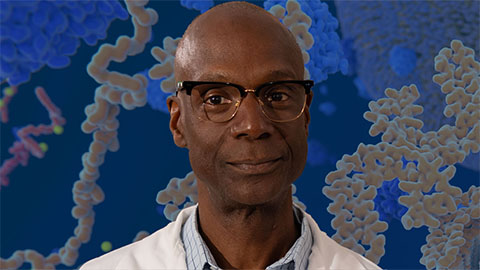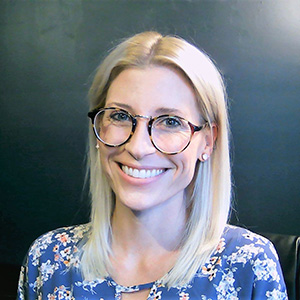Offensive strategies in the lab
Braden Lewis has been an Iowa State University football fan as far back as he can remember. Both his parents graduated from ISU, so Lewis developed an early love for Cyclone football games. He’s also a lifelong lover of science, eager to play with microscopes ever since first grade. Those combined interests led him to pursue a science degree at ISU, where he’s now a junior in the biochemistry department and an undergraduate researcher in a food microbiology laboratory.

What does that have to do with football? Lewis’ knowledge of the game inspired his research, and he has developed an innovative biochemistry technique based on offensive gridiron strategies.
Lewis was introduced to food microbiology when he joined Aubrey Mendonça’s lab as a first-year honors student. He began by supporting the work of graduate students, and within a year he was hired as an undergraduate researcher. Since then, he’s been running his own studies to improve pathogen reduction methods for the food industry.
Typically, food is preserved and pathogens reduced via pasteurization, canning and the use of antimicrobial compounds. Yet these established techniques sometimes can impact the flavor profile or nutritional value of food. Chemical preservatives also can scare consumers away. To make food preservation safer, more natural and more consumer friendly, the Mendonça lab is exploring the use of nonthermal technologies and natural antimicrobials and preservatives.
In developing his own research project, Lewis decided on a combination strategy to improve food preservation: high-voltage atmospheric cold plasma, or HVACP, and cinnamaldehyde.
HVACP is a processing technique that can wash food without raising its temperature or destroying essential nutrients. It is a simple technology that works by applying an electric field to atmospheric air to create reactive oxygen and nitrogen species that kill bacteria. Cinnamaldehyde is the natural chemical compound that give cinnamon its flavor and odor, and it is also with known to have antimicrobial properties.
“I’m kind of a huge sports guy, so I’ve always thought of this project like offensive strategy in a football game,” Lewis said. “There are two ways to move the ball. You can run the ball or you can pass it. … But it's really that combination of running and passing that is much more effective than either one alone.”
He was right. The combination of HVCAP and cinnamaldehyde had a synergistic effect and reduced bacterial content from “millions to 10 or less in just a few minutes,” he said.
Lewis was killing bacteria, preserving the food (in this case, pineapple juice) and retaining nutrients without using heat or harsh chemical interventions.
Lewis was excited to share his technique with others at the Discovery BMB conference in Seattle. He plans to pursue a Ph.D. after graduation, with the goal of becoming a professor. Now a teaching assistant for a biochemistry course and a peer mentor, he offers this advice to other undergrads: “Be willing to try anything. The worst case scenario is that you might learn that you don’t really like a particular topic, and that’s okay. Sometimes that’s just as important.”
Mendonça has similar words of advice for students: “In many instances … good professors can demystify these things for you and make (learning) a pleasurable experience. Braden is actually a biochemist and never believed he would have loved microbiology. Now he wants to do a minor in microbiology.”
Enjoy reading ASBMB Today?
Become a member to receive the print edition four times a year and the digital edition monthly.
Learn moreGet the latest from ASBMB Today
Enter your email address, and we’ll send you a weekly email with recent articles, interviews and more.
Latest in People
People highlights or most popular articles

Designing life’s building blocks with AI
Tanja Kortemme, a professor at the University of California, San Francisco, will discuss her research using computational biology to engineer proteins at the 2026 ASBMB Annual Meeting.

Jordahl named Gilliam Fellow
He will receive three years of funding to support his thesis research.

Bibel named assistant professor
She began her position at Loyola Marymount University in August 2025.

Unraveling the language of histones
Philip Cole presented his research on how posttranslational modifications to histones are involved in gene expression and how these modifications could be therapeutically targeted to treat diseases like cancer.

Cotruvo named Blavatnik award finalist
He received a $15,000 prize and was honored at a gala in October.

Phosphatases and pupils: A dual legacy
Yale professor Anton Bennett explores how protein tyrosine phosphatases shape disease, while building a legacy of mentorship that expands opportunity and fuels discovery in biochemistry and molecular biology.

